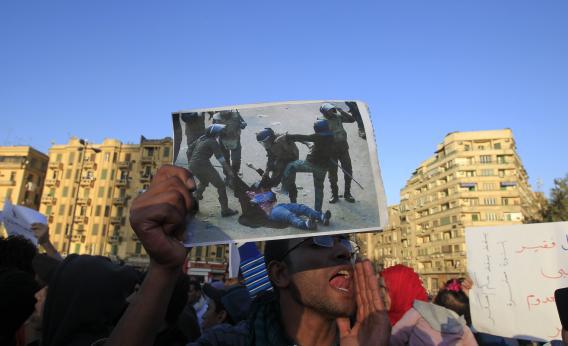Like you, Brian, I read this week’s coverage of the Tahrir Square protests with shock not only at the hatred in former Gen. Kato’s remarks that a widely photographed beaten protester was “a vagrant who should be burnt in Hitler’s incinerators”, but at the reactions from some Egyptian men. Of course those kinds of comments—she should have been at home (Read: she made herself a target), she wore a brightly colored bra (Read: she secretly wished to be violated), she could have layered her clothing (Read: she neglected important precautions) —echo the victim-blaming rhetoric that can haunt sexual violence in the States. Still, they’re totally dispiriting to hear, and I say that knowing it’s unfair to want to be inspired by post-Mubarak Egypt, as if all the Arab Spring states had an obligation to radiate humanist principles even when the U.S. hasn’t yet gotten them down.
But. Did you notice anything odd about how Egyptian officials were describing the protest movement? In a news conference on Saturday, Prime Minister Kamal el-Ganzouri accused his people of reactionary mischief, claiming that “This is not a revolution, but a counter-revolution.” Tahrir activists “threw rocks and destroyed everything they came across,” he claimed, despite the government’s best efforts to keep peace. Then, on Sunday morning, the Egyptian state press reported that “thugs” had incinerated the Egyptian Institute, a storehouse of historical documents overlooking the main square. In fact, as Sarah Mousa at Al Jazeera points out, soldiers had been lobbing Molotov cocktails from the building’s windows, and when several protesters retaliated with their own fire bombs, the structure was set ablaze and the soldiers fled, leaving civilians to rush inside for the rare books. In a speech to journalists on Monday, Gen. Adel Emara of the Supreme Council of Armed Forces continued to wave the tarring brush. He said of the #bluebra beating, “Yes, this scene took place and we’re investigating it. But let’s look at the whole picture and see the circumstances the picture was taken in and we will announce the complete truth” As if a more panoramic understanding could help explain the humiliating attack on an unarmed protester. Pressed about police violence, Emara further implied that protesters were scheming to “destroy the state” and snapped, “Why don’t you talk about the excessive use of violence by the other side?”
In one sense, this defensive posture seems utterly typical. It’s just that the government’s smear campaign against the protesters uncannily parallels those classic “blame the victim” quotes from the Egyptian men. Look at the whole picture. They deserved it. I guess bullies, whether misogynistic or more generally anti-democratic, tend to pursue the same strategies of deflection whenever they’re called out. It’s interesting, too, that multiple government officials have used the word “thug” to characterize the activists. Even the NACF’s conciliatory press release Tuesday (a response to the women’s rights march earlier that day) reaffirmed a commitment to rooting out “infiltrating and paid agents of thuggery” from the protesting ranks. Personally, I imagine a thug as a big, hulking, menacing guy: The term strikes me as unavoidably gendered. In representing their opponents—including brutalized women— as thugs, do Egyptian leaders take the “blaming the victim” trope to a new level? On one hand, such topsy-turvy morality is egregious and scary. On the other, that the military government would nervously displace the specifics of its own offenses onto the protesters might mean it realizes it has crossed a line.
